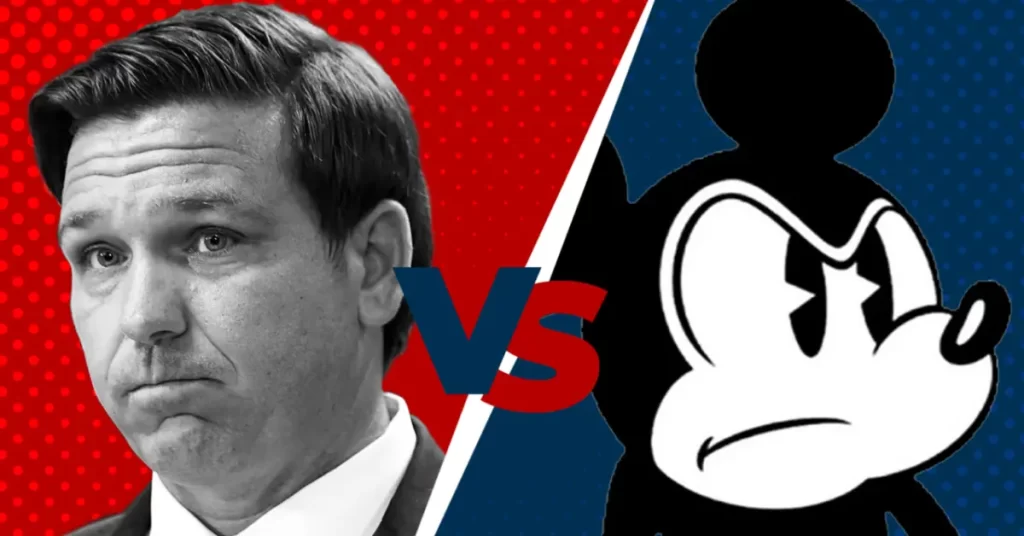Florida Governor Ron DeSantis is aiming to put an end to the ongoing legal dispute with Disney, according to court records filed by his attorneys this week. The mass media company had filed a lawsuit against the Republican presidential candidate in April, alleging that he revoked their self-governing rights over the 25,000-acre site of Walt Disney World in Orlando. Disney claimed that DeSantis had targeted and retaliated against them due to their opposition to his “Don’t Say Gay” bill, which restricts education on sexual orientation and gender identity in certain Florida classrooms.
DeSantis’ legal team has now requested immunity from the case, seeking to have the lawsuit dismissed and absolve him from any further legal action, liability, or punishment. In their filing, his attorneys argued that Disney’s claims lack legal merit and should be rejected by the court.
While Disney has not yet responded to the request for comment, their lawsuit stated that they found themselves in this “regrettable position” because they expressed a viewpoint that Governor DeSantis and his allies disagreed with. As one of the largest taxpayers and employers in the state, Walt Disney Parks and Resorts emphasized the importance of their contributions to Florida.
The disagreement between DeSantis and Disney centers around the company’s desire to regain its long-standing self-governing rights over the Walt Disney World Parks and Resorts, which were previously under the jurisdiction of The Reedy Creek Improvement District. However, DeSantis signed a bill in February that stripped Disney of this authority, renaming the district the Central Florida Tourism Oversight District. His administration stated that the legislation aimed to eliminate preferential treatment for The Walt Disney Co. and ensure that it adhered to the same laws and tax obligations as other entities.
Prior to the bill’s signing, Disney’s special district enjoyed exemptions from Florida’s Building Code, Fire Prevention Code, and state regulatory reviews and approvals. However, DeSantis argued that allowing a corporation to govern itself was not sound policy, especially when its decisions impacted an entire region. He believed that the new legislation would level the playing field and hold Disney accountable for its debts and fair share of taxes.
Previously: Disney Cancels Florida Campus and Employee Relocation
The rift between DeSantis and Disney intensified when the company publicly criticized the Governor’s Parental Rights in Education Act, which opponents dubbed the “Don’t Say Gay” bill, at a shareholder meeting in March of the previous year. Disney’s then-CEO, Bob Chapek, expressed opposition to the bill and announced a $5 million donation to organizations that protect LGBTQ rights. DeSantis subsequently signed the bill into law, further fueling the tensions between the two parties.
Disney’s lawsuit, filed in April, alleges that DeSantis retaliated against the company for its stance on the “Don’t Say Gay” bill by revoking their self-governing rights. The company asserts that the Governor’s actions were unconstitutional, anti-business, and motivated by animosity. Additionally, Disney’s attorneys criticized DeSantis for various other threats made against the company, such as potential taxes on hotels, tolls on roads, development on district-owned property, and even the placement of a state prison near Walt Disney World. They claimed that legal action was necessary to protect their employees, guests, and local partners from what they viewed as a campaign to weaponize government power against Disney in retaliation for expressing a politically unpopular viewpoint.
Disney is seeking a court declaration that Senate Bill 4C and House Bill 9B, which were enacted to curtail their self-governing rights, are unlawful and unenforceable. They argue that these bills were passed as a retaliatory measure against their political speech, thus violating the First Amendment. The case will ultimately be decided by a federal judge, who will determine whether DeSantis should be granted immunity from Disney’s lawsuit.
Governor DeSantis’ administration has responded to the lawsuit by labeling it as another attempt by Disney to undermine Florida voters and operate outside the confines of the law. They maintain that the company has no legal right to govern itself or enjoy special privileges not afforded to other businesses in the state. In a news conference held in Jerusalem, DeSantis dismissed the lawsuit as politically motivated.
The resolution of this case now rests in the hands of the federal judge presiding over the matter, who will consider the arguments put forth by both parties and decide whether to grant DeSantis immunity from Disney’s lawsuit.



